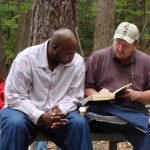Starting together
Earlier this week, I mentioned that Sol from “Looking for Church” wanted to begin getting together with other brothers and sisters in his home during the week.
He asked for help. And several people made suggestions… some very good suggestions. Sol made each comment advice into a new post.
I thought it would be beneficial for my readers to see all of this good advice. So, here are his posts, beginning with the posts where he talks about beginning to meet together:
- Starting with a Meeting
- We Want To Get Together
- Family… Not “Church”
- A Family… With A Purpose
- Don’t Over Think It
I think there is some very good advice in those comments/posts… the kind of advice that can help any group of believers. What do you think?
Daily, sacrificial, authentic, missional living
Mark at “renrutkram” has written an excellent post called “What is ‘outreach’?”
While Mark recognizes the “big events” in scriptural examples of proclaiming the gospel, he says these one times events (Paul preaching at Mars Hill, for example) are always combined with relationship and community which is “evidenced throughout the Scriptures.”
How does that apply to us today? Should community and relationship be evidenced throughout the church today? Yes, even though it is difficult. Mark says:
In my own life, daily discipleship is much harder than one-time events. I don’t particularly mind large, attraction-based, event-oriented evangelism (though I question their effectiveness in today’s culture). However, one-time evangelism must be accompanied by daily, sacrificial, authentic, missional living. I find it much harder to mentor a student weekly than take teenagers to camp once a year. It is much more time-consuming to volunteer in the local middle school than throw a Superbowl party. I have to be vulnerable when I share my life with other people and that scares me. When you share life you share success and failure, strengths and weaknesses.
By God’s grace I will strive to demonstrate the gospel not just once in a while but every day.
Yes! Do you want to host a “big event”? Great! But, do you have the “daily, sacrificial, authentic, missional living” that must go along with it? If not, then the “big event” will soon fizzle into a faded memory.
But, with “daily, sacrificial, authentic, missional living” the gospel is brought to bear on everything that we do, with or without a “big event.”
It’s not easy. In fact, it is absolutely impossible, which is why God works through us in his power when we serve others for him.
Dave Black’s essay on “The Lord’s Supper”
In response to a new book about the Lord’s Supper, Dave Black has written a short essay called “The Lord’s Supper, Then and Now.”
Did you know that the way you partake of “The Supper” demonstrates what you believe about God, Jesus, and the church? It’s true.
In his essay, Black spells out several aspects of modern practices of the Lord’s Supper that are radically different (perhaps even contradictory) to the way the church ate a common meal together as described by the NT authors.
This paragraph is my favorite:
Is it too much to hope that our churches today might return to this biblical model? How can we start to overcome our lethargy? We can only do this, as I have said, when we return to a commitment to obedience. Wherever the church honestly faces its task to be scriptural in all its dealings, believers will discover new ways and means of restoring modern practices to their ancient models. Acts 20:7 underscores this point. Here Luke speaks of a meeting of the church in which the focal point was not a sermon but a common meal. This was apparently the common practice of the early church whenever they gathered on “the Lord’s Day.†Today we gather for “worship†and occasionally tack on the Lord’s Supper almost as an addendum. I imagine this would have appeared very strange to New Testament eyes! The early church knew nothing of worship services or worship centers or worship teams or worship folders. Nor were the earliest gatherings of Christians “top heavy,†leaving the ministry to a handful of selected professionals. Theirs was a one-class society – all saints, all priests, all members of the Christian brotherhood with Christ as their only Head. This is why, I surmise, the Lord’s Supper was so important to them. The Supper offers us an occasion to focus on our Great High Priest, the church’s only Senior Pastor (see 1 Pet. 5:4). Moreover, it seems that the Lord’s Supper was a full meal in New Testament times. Indeed, if we ask ourselves what the word “supper†means, we find that the Greek word used is deipnon, which generally refers to the chief meal of the day. Such is its meaning consistently in the pages of the New Testament. Would it be too radical to suggest that the way in which the Lord’s Supper was observed in the early church – as a full meal – could also be replicated today?
I’ve found that, yes, it is possible for churches today to begin eating the Lord’s Supper as a full meal. But, it is radical, because several things had to change (things mentioned by Black above) before this was possible.
Share your experience and advice
Sol at “Looking for Church” has written a post called “Starting With A Meeting.”
In this post, Sol explains that he is planning to begin meeting with other brothers and sisters in Christ at his house during the week. While he says that he wants “more than a meeting,” he understands that whatever happens will probably begin with a meeting.
Sol writes:
As I mentioned yesterday, several of us here are going to start getting together at my house during the week. I’ve been searching the web, and poking around on some blogs for advice…
I’m hoping for more advice on this too.
I’m sure others have experiences and advice to share, so please comment if you can. I would love to hear it… and I need it.
I left him my 2 cents worth in a comment here, which he’s copied in his post. Can you give him some advice also? Perhaps you can share your experience?
Jump over to Sol’s post and help him out.
Is it all just talk?
Sometimes, when I write blog posts or comment on other blog posts or even respond to comments on my posts, it seems like it’s all just talk. I wonder, “Are we all just talking to each other, or are the posts and comments actually helping people change?”
Last week, Keith at “subversive1” published his posts called “How to Start a Ministry to the Poor in your Community.” I linked to his articles in my post “Jesus will lead you to ‘the least.’” (Several other people linked to Keith’s articles too.)
In response to the comments on my article, Dan at “The Ekklesia in Southern Maine” wrote a post called “A Conversation on Reaching Out.”
So far, it’s still all just talk. That is, it’s all just talk until you read the comments on Dan’s post. This is what Jeremy and Dan write:
Jeremy:
By the way…based on what both Alan and Keith said, I think I may have already found a place to get involved with. It’s a ministry for the children of migrant workers. We are very excited about it, and hope it works out.
Dan:
Based on that conversation and some stuff I had been thinking about we are going to get involved by providing people with heating oil. That is a major difficulty for families this far north, especially considering it costs over $3 a gallon right now.
I figure that is a good way to apply those principles to our situation, living in the woods in Maine.
This is awesome! It’s not just talk when we actually change what we’re doing!
And, to all of this, I say: To God be the glory! And, I thank him for the opportunities that he’s given me, Keith, Jeremy, Dan, and others to serve people in the name of Jesus. I pray that he continues to give us opportunities and strength and a desire to serve him by serving others, and that he uses our efforts to produce fruit and build his kingdom!
Jesus will lead you to “the least”
So, here’s the deal. If you’re following Jesus, he will lead you to “the least.” (If you don’t know who “the least” are, then please read Matthew 25:31-45.)
Where Jesus certainly answers a few theological type questions, I don’t see examples of him sitting around for house discussing the minute details of a specific theological issue. (Perhaps that’s only because he couldn’t get enough people to come to his conference?)
Anyway, I know that everyone and their sister is linking to these posts written by Keith from “subversive1,” but I want to link to them too, in case you haven’t seen them:
How to Start a Ministry to the Poor in your Community: Part 1, Part 2, Part 3, Part 4, and Part 5.
Perhaps you are already serving the poor, the hungry, the thirsty, the unemployed, the elderly, the orphans, etc. in your community. Great! Please write about it so that others can follow your example. (Many Christians have NEVER seen an example of other Christians serving “the least.”) However, if you are not serving others, then why not follow some of Keith’s suggestions?
By the way, you may disagree with the way that Keith is serving, or you may disagree with the way that I’m serving, but if you are not serving “the least,” then our ways are much, much better than your way. So, if you want to disagree, do so with a lifestyle of service and not just your words.
History of Israel Between 539BC and 9 BC
I love history. It’s true. My wife often makes fun of (well, not in a bad way) my son and me because we will talk history for hours.
There’s another blogger who loves history, and he writes about it! His name is Bill and his blog is “NT/History Blog.” His latest post, which is the prologue of a series that he’s writing, is called “Between the Testaments.”
This post covers the history of Israel/Palestine (primarily) from 529 BC until 9 BC. Bill connects the history of Israel with what was happening in Persia, Greece, and Rome.
It is a fascinating (even enjoyable) read. Even if you don’t normally like history, you should read his post. You’ll find out how Anthony and Cleopatra connect to Scripture.
Money back guarantee?
Sometime last week, I saw a bumper sticker that read, “Try Jesus.” I asked my family what they thought it meant. We tossed around a few ideas – none of them good ideas as far as I could tell. So, I put the question to my Facebook friends: What does this bumper sticker? How can it be a good exhortation?
Now, it seems that Dan from “The Ekklesia is Southern Maine” has thought about this bumper sticker and written a serious post about it. His post is called “Trying Jesus.” After giving us two possibilities for the meaning of “Try Jesus,” Dan says:
I think they both have a major flaw. It is one of the two words, and obviously it isn’t the word “Jesus.†The word “try†implies seeing if something works for you, it’s as if you are saying “give Jesus a shot.†Why? For practical benefit. I don’t believe we can simply “give Jesus a shot†since following him implies dying to one’s self and completely surrendering to Him as Lord. It seems hard to me to believe that you could try that on for size.
Exactly! Jesus isn’t a product to be tried in order to decide if we like it (him) or not. We can’t try surrender. We can’t try death. We can’t try… well, you get the picture.
Of course, I’ve run into people who have said something like, “I’ve tried that church stuff (or religion stuff), and it didn’t work for me.” I think the answer to a statement like this is, “You’re absolutely right. Trying it will never work for you.”
What do you think?
A novel idea for biblical scholars
Andy at “Turning Jordan” has offered a novel idea for biblical scholars: “Bible scholars should read the Bible.”
Interestingly, he’s not joking. It’s a serious post. And, it should be.
For example, I’m currently studying Colossians. While I’m studying, if I spend more time reading what “so-and-so” said about Colossians, than what Paul said to the Colossians, then there’s a big problem.
Andy offers seven tips. Given one of my previous posts about beginning to study Colossians, I really appreciate his #3 tip:
3) We have a tendency in biblical scholarship to want to parse out tiny details. That is good, and necessary, but try reading to get some of the bigger picture.
Good tip, Andy. Read and read and read and read. Know the big picture before you begin to diving into the details. Then, when you’re studying the details, keep reading.
Expectations for Leaders
Felicity at “Simply Church” is working through a series on leaders.The series has been very good so far. She is asking good questions that believers/churches should consider as they seek to recognize/appoint/follow leaders.
One of her posts asks “What do we expect of our leaders?”
Since Rick recently requested (in a comment) that I continue writing about my understanding of leadership among the church (and the implications of having official elders), I thought I would share my comment on Felicity’s post here:
I expect the same thing from leaders that I expect from everyone else: living their lives in demonstration of the gospel of Jesus Christ. The people that I follow (imitate, learn from, whatever) – that is, leaders – I do not follow because they have been chosen or recognized or appointed, but because they are consistently obedient to Jesus Christ and they are a good example of living in him through the Spirit.
What do you think? What do you expect from leaders?









